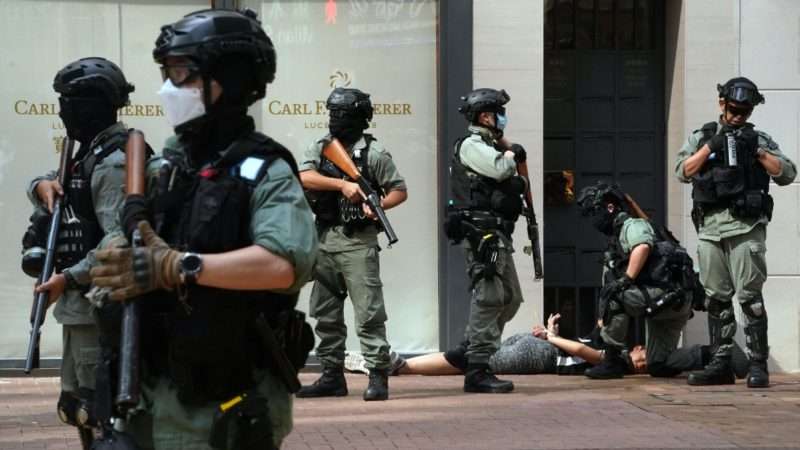
“The West tends to glorify” pro-democracy protesters “as defenders of Hong Kong’s freedoms, but they have done great harm to the city by going against its constitutional order and stirring up chaos and disaffection toward our motherland,” declares a New York Times op-ed published today.
Penned by Regina Ip, a legislator and member of Hong Kong’s Executive Council, the piece reads as a paean to law and order, arguing in favor of the brutal national security law China recently imposed on Hong Kong, which has long operated under the “one country, two systems” agreement.
This arrangement had long guaranteed that Hongkongers have basic speech and due process protections. But in February 2019, those freedoms were threatened by a proposed extradition treaty (since withdrawn) that would have allowed Hongkongers accused of crimes to be extradited to mainland China and subjected to its unpredictable, capricious justice system.
This set off months of protests and calls for Chief Executive Carrie Lam to step down, with millions turning out to fight for their freedom. Many were met with aggressive police tactics, including the deployment of munitions that left some protesters blind or injured. Then Beijing enacted a national security law on June 30. It vaguely targets “secession, subversion of state power, foreign interference and terrorism,” and it has been used to suppress speech; since it passed, many activists have fled the city.
Which brings us to the Times piece. Ip argues:
Hong Kongers who wanted the city promptly to return to peace thought the authorities’ handling of the situation, which dragged on for months and grew more and more violent, was incompetent. For other locals, many outsiders and apparently much of the global media, a people’s legitimate quest for more democracy was being suppressed.
Something had to be done, and the Chinese authorities did it.
The scale and frequency of antigovernment protests has now subsided—thanks to a national security law for Hong Kong promulgated in Beijing on June 30.
Ip spends much of the article fearmongering about radical factions of the pro-democracy movement. She also laments that the city has been downgraded on prominent economic freedom indexes over the past year. Hong Kong was downgraded for “ongoing political and social turmoil” and “Beijing’s recent ‘interventions,'” and its first-place status could very well be restored if Beijing would stop attempting to bring the city under its tightfisted rule. But Ip insinuates the protesters are at fault.
She then downplays how people’s lives and speech have been affected by the introduction of the law, saying it will be tested in court and that only “about 28 people have been arrested under the law.” She writes, “To some, the new national security law is especially chilling because it seems simultaneously vague and very severe. But many laws are vague, constructively so. And this one only seems severe precisely because it fills longstanding loopholes—about subversion, secession, local terrorism, collusion with external forces.”
Actually, the law seems severe because it’s an attempt by an oppressive one-party regime to crush the freedoms that make Hong Kong a desirable place to live, learn, and work.
This is rich. "The West tends to glorify these people as defenders of Hong Kong’s freedoms, but they have done great harm to the city by going against its constitutional order and stirring up chaos and disaffection toward our motherland."
— Liz Wolfe (@lizzywol) October 1, 2020
This is the same newspaper that erupted in internal conflict over an op-ed by Sen. Tom Cotton (R–Ark.) that suggested federal troops ought to “restore order in our streets” after the police killing of George Floyd. Many Times writers claimed that the piece put black staffers’ lives in danger, and the editor responsible for running it, James Bennet, resigned.
Just as Tom Cotton’s viewpoints on squashing civil disobedience in the streets are emblematic of many mainstream conservatives’ views, which plausibly merits coverage, there’s a case to be made that Ip’s views are representative of some Chinese and Chinese-American views on the relationship between Hong Kong and the mainland, meriting coverage too. But it’s hard to come up with a justification for running Ip’s essay that doesn’t apply to Cotton’s too.
Praising the severity and vagueness of a law allowing fleeing political dissidents to be shipped off to an opaque authoritarian regime falls within the @nytimes range of acceptable opinion. pic.twitter.com/1YBjm5gsGJ
— Zach Weissmueller (@TheAbridgedZach) October 1, 2020
Opinion pages ought to include a wide range of views, whether or not we personally find them reasonable. But Ip’s argument, for the record, is not reasonable at all. It distorts the situation in Hong Kong, spinning a fantasy of a just government restoring social order. Vague laws that give an authoritarian regime wide latitude to crack down on dissent are not, in fact, a recipe for freedom or for peace.
from Latest – Reason.com https://ift.tt/2SiFmg0
via IFTTT